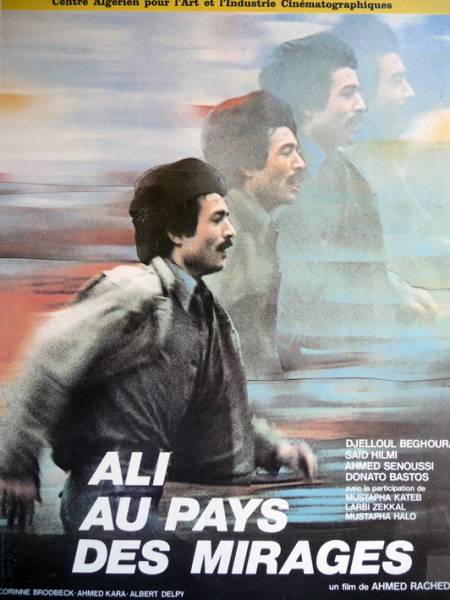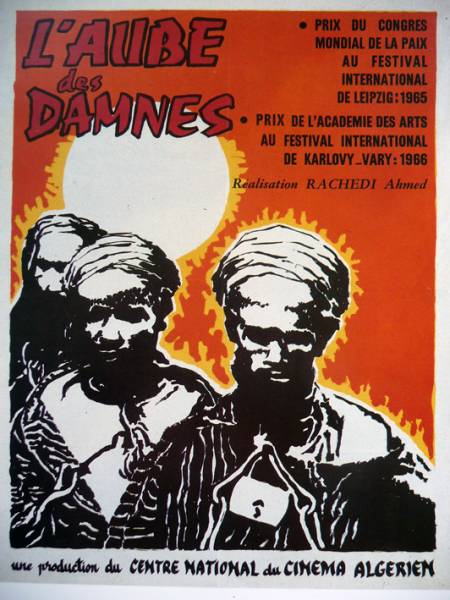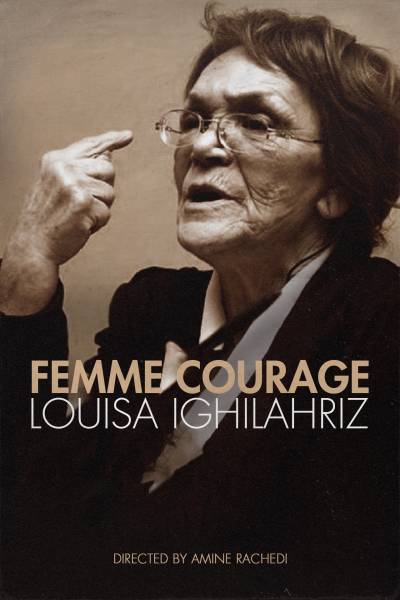Fiche Personne
Cinéma/TV
Média
Patrimoine
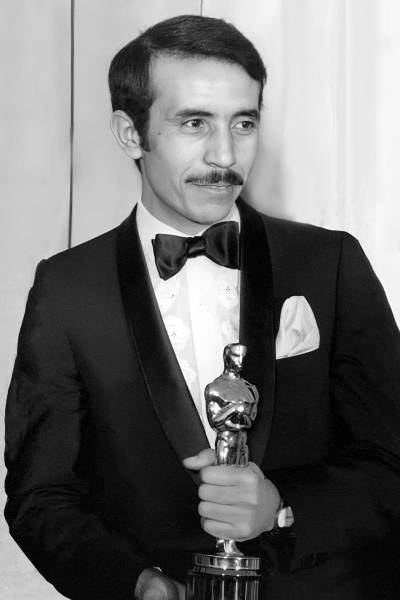 © Nabil Maheidine
© Nabil Maheidine
Ahmed Rachedi
Réalisateur/trice, Producteur/trice, Scénariste
(Homme)
Algérie
 © Nabil Maheidine
© Nabil Maheidine
Français
Ahmed Rachedi (en arabe : أحمد راشدي), né en 1938 à Tébessa, est un cinéaste, scénariste, producteur et conseiller ministériel algérien.
La guerre d'indépendance est son école : Ahmed Rachedi appartient, avec René Vautier et Mohamed Chanderli, à la première unité cinématographique du FLN. Il gagne Tunis où son travail porte sur le reportage, le montage, ainsi que le court métrage (il en réalise plusieurs après l'indépendance). Il participe à des films collectifs et en dirige certains. En 1962 il est l'un des membres fondateurs, avec le même René Vautier, du centre audiovisuel CAV. Il se fera connaître avec "L'aube des damnés" (1965) et "L'opium et le bâton" (1971), adapté du roman éponyme publié en 1965 par Mouloud Mammeri, et présenté à la quinzaine des réalisateurs au festival de Cannes.
Il réalise en France, sur un scénario de Rachid Boudjedra, un témoignage sur les travailleurs émigrés, Le Doigt dans l'engrenage. En 1970, alors qu'il dirige à sa création et jusqu'en 1971 l'Office national pour le commerce et l'industrie cinématographique (ONCIC), il prend part à la production du célèbre film "Z" du réalisateur Costa Gavras qui décroche l'Oscar du meilleur film en langue étrangère pour le compte de l'Algérie.
Ahmed Rachedi devient producteur indépendant. Il tourne en 1986 une comédie politique, Le Moulin de monsieur Fabre, film interprété notamment par Jacques Dufilho. Il adapte en 1990, pour le cinéma et la télévision, le roman d'Amin Maalouf Léon l'Africain. En 1993, son téléfilm C'était La Guerre coréalisé avec Maurice Falevic, a obtenu le prix du FIPA d'or.
Depuis 2009 il s'est complètement consacré aux films historiques en réalisant plusieurs biopics dédiés à la vie et au parcours de figures de la guerre de libération nationale. Il a sorti le long métrage "Mostefa Ben Boulaïd" en 2009 qui sera suivi en 2015 de "Krim Belkacem", film historique sur le parcours de cette figure de la révolution, et de "Lotfi", dédié au parcours du Colonel Lotfi.
En 2018 il sort son dernier film "Les Sept Remparts De La Citadelle", adaptée du roman éponyme écrit par Mohamed Maarfia.
En 2021, Ahmed Rachedi a été nommé au poste de Conseiller auprès du Président de la République algérien, chargé de la culture et de l'audiovisuel.
http://www.imdb.com/name/nm0705085
La guerre d'indépendance est son école : Ahmed Rachedi appartient, avec René Vautier et Mohamed Chanderli, à la première unité cinématographique du FLN. Il gagne Tunis où son travail porte sur le reportage, le montage, ainsi que le court métrage (il en réalise plusieurs après l'indépendance). Il participe à des films collectifs et en dirige certains. En 1962 il est l'un des membres fondateurs, avec le même René Vautier, du centre audiovisuel CAV. Il se fera connaître avec "L'aube des damnés" (1965) et "L'opium et le bâton" (1971), adapté du roman éponyme publié en 1965 par Mouloud Mammeri, et présenté à la quinzaine des réalisateurs au festival de Cannes.
Il réalise en France, sur un scénario de Rachid Boudjedra, un témoignage sur les travailleurs émigrés, Le Doigt dans l'engrenage. En 1970, alors qu'il dirige à sa création et jusqu'en 1971 l'Office national pour le commerce et l'industrie cinématographique (ONCIC), il prend part à la production du célèbre film "Z" du réalisateur Costa Gavras qui décroche l'Oscar du meilleur film en langue étrangère pour le compte de l'Algérie.
Ahmed Rachedi devient producteur indépendant. Il tourne en 1986 une comédie politique, Le Moulin de monsieur Fabre, film interprété notamment par Jacques Dufilho. Il adapte en 1990, pour le cinéma et la télévision, le roman d'Amin Maalouf Léon l'Africain. En 1993, son téléfilm C'était La Guerre coréalisé avec Maurice Falevic, a obtenu le prix du FIPA d'or.
Depuis 2009 il s'est complètement consacré aux films historiques en réalisant plusieurs biopics dédiés à la vie et au parcours de figures de la guerre de libération nationale. Il a sorti le long métrage "Mostefa Ben Boulaïd" en 2009 qui sera suivi en 2015 de "Krim Belkacem", film historique sur le parcours de cette figure de la révolution, et de "Lotfi", dédié au parcours du Colonel Lotfi.
En 2018 il sort son dernier film "Les Sept Remparts De La Citadelle", adaptée du roman éponyme écrit par Mohamed Maarfia.
En 2021, Ahmed Rachedi a été nommé au poste de Conseiller auprès du Président de la République algérien, chargé de la culture et de l'audiovisuel.
http://www.imdb.com/name/nm0705085
English
Ahmed Rachedi (Arabic: أحمد راشدي), born in 1938 in Tébessa, is an Algerian filmmaker, screenwriter, producer and ministerial advisor.
The war of independence is his school: Ahmed Rachedi belongs, with René Vautier and Mohamed Chanderli, to the first cinematographic unit of the FLN. He went to Tunis where his work focused on reporting, editing, as well as short films (he made several after independence). He participates in collective films and directs some of them. In 1962 he was one of the founding members, with the same René Vautier, of the CAV audiovisual center. He became known with "The Dawn of the Damned" (1965) and "The Opium and the Stick" (1971), adapted from the eponymous novel published in 1965 by Mouloud Mammeri, and presented at the directors' fortnight at the Cannes Film Festival. . In France, based on a screenplay by Rachid Boudjedra, he directed a story about emigrant workers, Le Doigt dans l'entreprises. In 1970, while he directed the National Office for Commerce and the Cinematographic Industry (ONCIC) from its creation and until 1971, he took part in the production of the famous film "Z" by director Costa Gavras which won the Oscar for best foreign language film for Algeria.
Ahmed Rachedi becomes an independent producer. In 1986 he filmed a political comedy, Le Moulin de monsieur Fabre, a film starring Jacques Dufilho. In 1990, he adapted Amin Maalouf's novel Léon l'Africain for cinema and television. In 1993, his TV film C'tait La Guerre, co-directed with Maurice Falevic, won the FIPA d'or prize.
Since 2009 he has devoted himself completely to historical films by directing several biopics dedicated to the life and journey of figures from the war of national liberation. He released the feature film "Mostefa Ben Boulaïd" in 2009 which will be followed in 2015 by "Krim Belkacem", a historical film on the journey of this figure of the revolution, and "Lotfi", dedicated to the journey of Colonel Lotfi.
In 2018 he released his latest film "Les Sept Remparts De La Citadelle", adapted from the eponymous novel written by Mohamed Maarfia.
In 2021, Ahmed Rachedi was appointed to the position of Advisor to the President of the Algerian Republic, responsible for culture and audiovisual.
http://www.imdb.com/name/nm0705085
The war of independence is his school: Ahmed Rachedi belongs, with René Vautier and Mohamed Chanderli, to the first cinematographic unit of the FLN. He went to Tunis where his work focused on reporting, editing, as well as short films (he made several after independence). He participates in collective films and directs some of them. In 1962 he was one of the founding members, with the same René Vautier, of the CAV audiovisual center. He became known with "The Dawn of the Damned" (1965) and "The Opium and the Stick" (1971), adapted from the eponymous novel published in 1965 by Mouloud Mammeri, and presented at the directors' fortnight at the Cannes Film Festival. . In France, based on a screenplay by Rachid Boudjedra, he directed a story about emigrant workers, Le Doigt dans l'entreprises. In 1970, while he directed the National Office for Commerce and the Cinematographic Industry (ONCIC) from its creation and until 1971, he took part in the production of the famous film "Z" by director Costa Gavras which won the Oscar for best foreign language film for Algeria.
Ahmed Rachedi becomes an independent producer. In 1986 he filmed a political comedy, Le Moulin de monsieur Fabre, a film starring Jacques Dufilho. In 1990, he adapted Amin Maalouf's novel Léon l'Africain for cinema and television. In 1993, his TV film C'tait La Guerre, co-directed with Maurice Falevic, won the FIPA d'or prize.
Since 2009 he has devoted himself completely to historical films by directing several biopics dedicated to the life and journey of figures from the war of national liberation. He released the feature film "Mostefa Ben Boulaïd" in 2009 which will be followed in 2015 by "Krim Belkacem", a historical film on the journey of this figure of the revolution, and "Lotfi", dedicated to the journey of Colonel Lotfi.
In 2018 he released his latest film "Les Sept Remparts De La Citadelle", adapted from the eponymous novel written by Mohamed Maarfia.
In 2021, Ahmed Rachedi was appointed to the position of Advisor to the President of the Algerian Republic, responsible for culture and audiovisual.
http://www.imdb.com/name/nm0705085
Films(s)
-
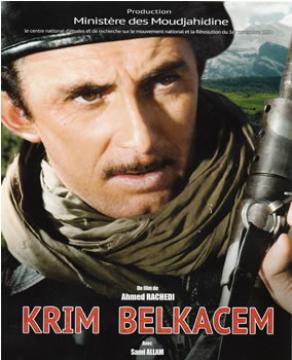 Krim Belkacem – كريم بلقاسمLong-métrage – 2014Le parcours révolutionnaire et politique de Krim Belkacem, un des symboles de la guerre de libération algérienne et un des principaux négociateurs aux accords d’Evian entre l’Algérie et la France. De la Seconde guerre mo…Ahmed Rachedi est lié(e) à ce film en tant que réalisateur/trice
Krim Belkacem – كريم بلقاسمLong-métrage – 2014Le parcours révolutionnaire et politique de Krim Belkacem, un des symboles de la guerre de libération algérienne et un des principaux négociateurs aux accords d’Evian entre l’Algérie et la France. De la Seconde guerre mo…Ahmed Rachedi est lié(e) à ce film en tant que réalisateur/trice -
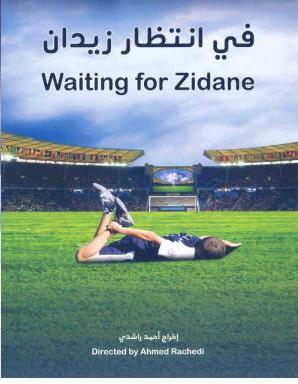 En attendant Zidane– 2010Un enfant de 7 ans, Yazid, rêve de devenir footballeur professionnel. Il participe à la Danone Cup et rencontre son idole… Zidane. Réalisateur : Ahmed Rachedi Prod: Al Jazeera ChildrenAhmed Rachedi est lié(e) à ce film en tant que réalisateur/trice
En attendant Zidane– 2010Un enfant de 7 ans, Yazid, rêve de devenir footballeur professionnel. Il participe à la Danone Cup et rencontre son idole… Zidane. Réalisateur : Ahmed Rachedi Prod: Al Jazeera ChildrenAhmed Rachedi est lié(e) à ce film en tant que réalisateur/trice -
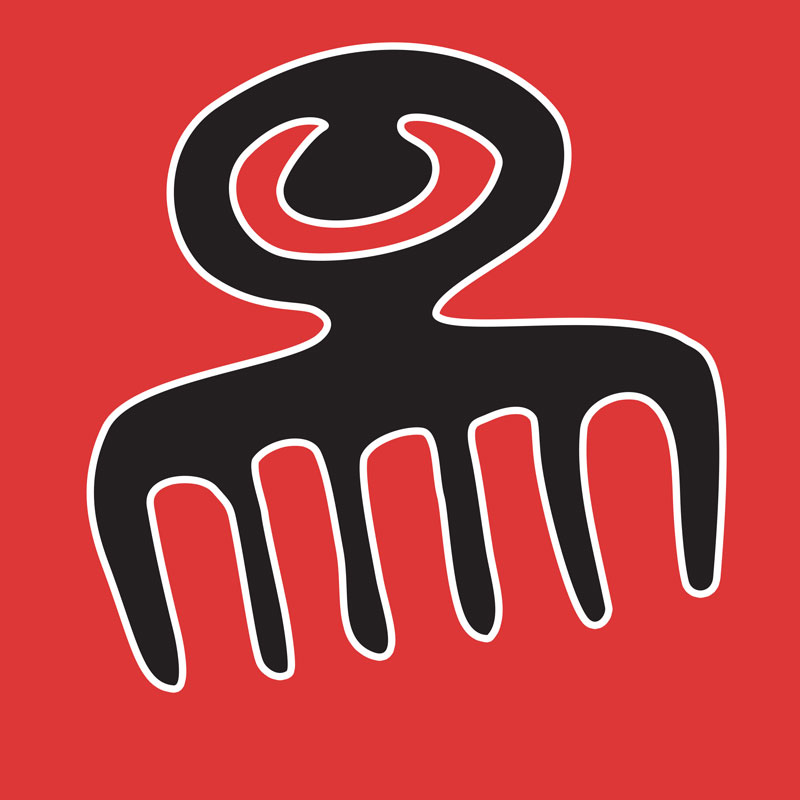 C’était la guerre– 1993Un film de Maurice Faillevic et Ahmed Rachedi, 1993, France – Algérie.Ahmed Rachedi est lié(e) à ce film en tant que réalisateur/trice
C’était la guerre– 1993Un film de Maurice Faillevic et Ahmed Rachedi, 1993, France – Algérie.Ahmed Rachedi est lié(e) à ce film en tant que réalisateur/trice -
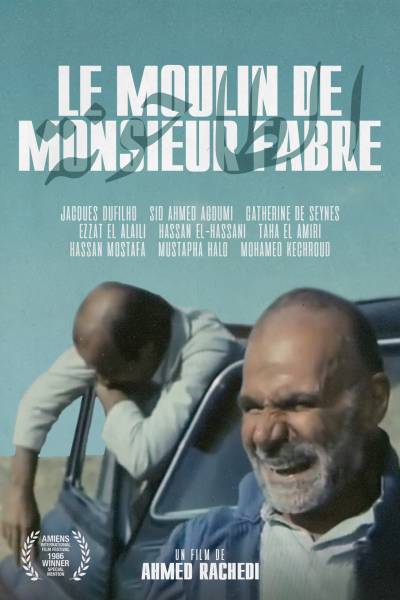 Le Moulin de Monsieur FabreLong-métrage – 1983"Le Moulin de Monsieur Fabre" est un film algérien de Ahmed Rachedi sorti en 1983. Synopsis L'histoire de la nationalisation post-indépendance du moulin de Monsieur Fabre, un vieil homme…Ahmed Rachedi est lié(e) à ce film en tant que réalisateur/trice
Le Moulin de Monsieur FabreLong-métrage – 1983"Le Moulin de Monsieur Fabre" est un film algérien de Ahmed Rachedi sorti en 1983. Synopsis L'histoire de la nationalisation post-indépendance du moulin de Monsieur Fabre, un vieil homme…Ahmed Rachedi est lié(e) à ce film en tant que réalisateur/trice -
 BarbelésCourt-métrage – 1981La vie quotidienne d'un village frontalier avant, pendant et après la guerre de Libération.Ahmed Rachedi est lié(e) à ce film en tant que réalisateur/trice
BarbelésCourt-métrage – 1981La vie quotidienne d'un village frontalier avant, pendant et après la guerre de Libération.Ahmed Rachedi est lié(e) à ce film en tant que réalisateur/trice -
Ali au pays des mirages (Ali fi bilad al-sarab)Long-métrage – 1979Un pauvre grutier immigre, victime du racisme environnant, vient de gagner a la loterie; ce qui modifiera totalement son existence actuelle. Coproduction franco-algérienne Réalisateur : Ahmed RACHEDI Scenario : Rach…Ahmed Rachedi est lié(e) à ce film en tant que réalisateur/trice
-
 Informatique en Algérie (L’)– 1973Documentaire réalisé par: Rachedi AhmedAhmed Rachedi est lié(e) à ce film en tant que réalisateur/trice
Informatique en Algérie (L’)– 1973Documentaire réalisé par: Rachedi AhmedAhmed Rachedi est lié(e) à ce film en tant que réalisateur/trice -
 Transports (Les)– 1973Documentaire réalisé par: Rachedi AhmedAhmed Rachedi est lié(e) à ce film en tant que réalisateur/trice
Transports (Les)– 1973Documentaire réalisé par: Rachedi AhmedAhmed Rachedi est lié(e) à ce film en tant que réalisateur/trice -
 SanaoudLong-métrage – 1972"Sanaoud" ("Nous Reviendrons" en français) est un film algero-palestinien réalisé par Mohamed Slimane Riad. Synopsis L'histoire d'un jeune Palestinien ayant quitt&ea…Ahmed Rachedi est lié(e) à ce film en tant que scénariste
SanaoudLong-métrage – 1972"Sanaoud" ("Nous Reviendrons" en français) est un film algero-palestinien réalisé par Mohamed Slimane Riad. Synopsis L'histoire d'un jeune Palestinien ayant quitt&ea…Ahmed Rachedi est lié(e) à ce film en tant que scénariste -
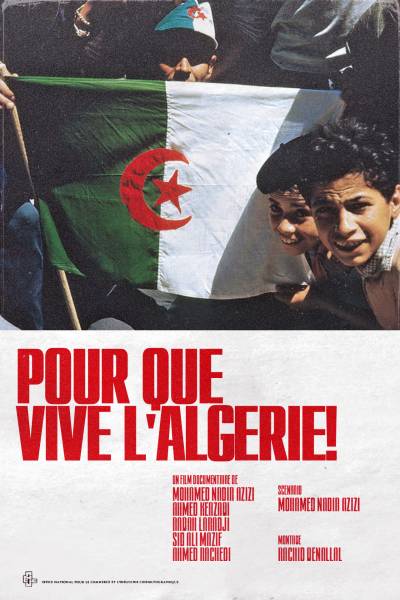 Pour que vive l’Algérie!Long-métrage – 1972"Pour que vive l'Algérie !" est un film documentaire algérien collectif célébrant les accomplissements de la révolution algérienne sorti en 1972. FICHE TECHNIQUE…Ahmed Rachedi est lié(e) à ce film en tant que réalisateur/trice
Pour que vive l’Algérie!Long-métrage – 1972"Pour que vive l'Algérie !" est un film documentaire algérien collectif célébrant les accomplissements de la révolution algérienne sorti en 1972. FICHE TECHNIQUE…Ahmed Rachedi est lié(e) à ce film en tant que réalisateur/trice -
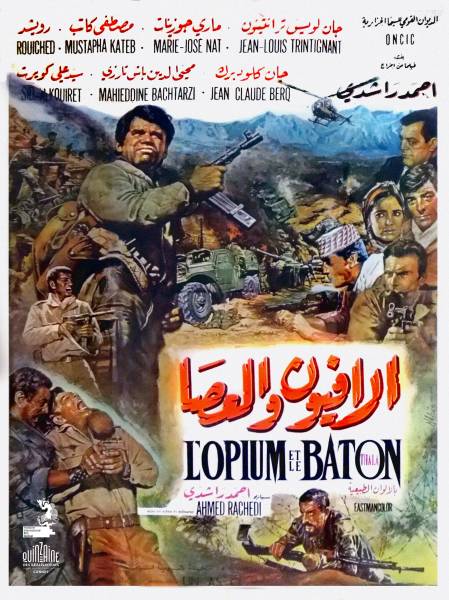 L’Opium et le BâtonLong-métrage – 1969"L'Opium et le Bâton" (الأفيون والعصا) est un film algérien réalisé par Ahmed Rachedi, sorti en 1971….Ahmed Rachedi est lié(e) à ce film en tant que réalisateur/trice
L’Opium et le BâtonLong-métrage – 1969"L'Opium et le Bâton" (الأفيون والعصا) est un film algérien réalisé par Ahmed Rachedi, sorti en 1971….Ahmed Rachedi est lié(e) à ce film en tant que réalisateur/trice -
 Élections (Les)– 1967Documentaire politique réalisé par Rachedi AhmedAhmed Rachedi est lié(e) à ce film en tant que réalisateur/trice
Élections (Les)– 1967Documentaire politique réalisé par Rachedi AhmedAhmed Rachedi est lié(e) à ce film en tant que réalisateur/trice -
 Commune (La)– 1966Documentaire réalisé par: Rachedi AhmedAhmed Rachedi est lié(e) à ce film en tant que réalisateur/trice
Commune (La)– 1966Documentaire réalisé par: Rachedi AhmedAhmed Rachedi est lié(e) à ce film en tant que réalisateur/trice -
Aube des damnés (L’) | Fajr al-mu’adhhabinLong-métrage – 1965L'une des premières grandes réalisations algériennes. Ce film est un montage d'images d'archives sur l'histoire de la colonisation en Afrique et sur les luttes de Libération. S…Ahmed Rachedi est lié(e) à ce film en tant que réalisateur/trice
-
 Des mains comme des oiseaux– 1964Documentaire réalisé par: Rachedi AhmedAhmed Rachedi est lié(e) à ce film en tant que réalisateur/trice
Des mains comme des oiseaux– 1964Documentaire réalisé par: Rachedi AhmedAhmed Rachedi est lié(e) à ce film en tant que réalisateur/trice -
 Cuba si (1964)– 1964Documentaire réalisé par: Rachedi AhmedAhmed Rachedi est lié(e) à ce film en tant que réalisateur/trice
Cuba si (1964)– 1964Documentaire réalisé par: Rachedi AhmedAhmed Rachedi est lié(e) à ce film en tant que réalisateur/trice -
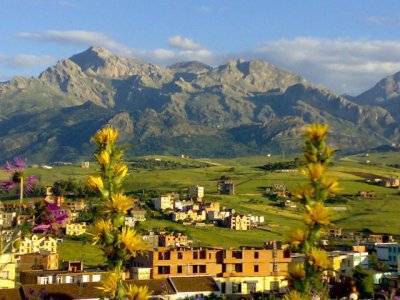 Ouadhias (les)– 1964La daïra d'Ouadhia est une circonscription administrative algérienne située dans la wilaya de Tizi Ouzou et la région de KabylieAhmed Rachedi est lié(e) à ce film en tant que réalisateur/trice
Ouadhias (les)– 1964La daïra d'Ouadhia est une circonscription administrative algérienne située dans la wilaya de Tizi Ouzou et la région de KabylieAhmed Rachedi est lié(e) à ce film en tant que réalisateur/trice -
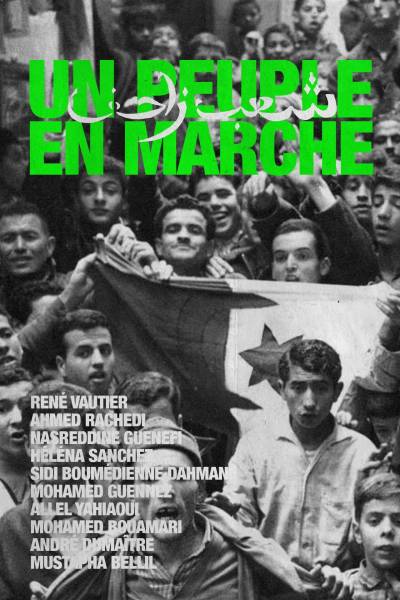 Un Peuple En MarcheMoyen-métrage – 1963Un Peuple En Marche fait un bilan de la guerre d'Algérie en retraçant l'histoire de l'ALN et montre l'effort populaire de reconstruction du pays, après l'indépendance. Sous…Ahmed Rachedi est lié(e) à ce film en tant que réalisateur/trice
Un Peuple En MarcheMoyen-métrage – 1963Un Peuple En Marche fait un bilan de la guerre d'Algérie en retraçant l'histoire de l'ALN et montre l'effort populaire de reconstruction du pays, après l'indépendance. Sous…Ahmed Rachedi est lié(e) à ce film en tant que réalisateur/trice -
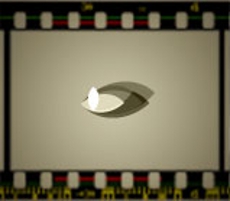 Tebessa année zéroCourt-métrage – 1963Documentaire de 15 mn sur le début de l'indépendance dans une petite ville de l'est algérien. Réalisateur : Ahmed RachediAhmed Rachedi est lié(e) à ce film en tant que réalisateur/trice
Tebessa année zéroCourt-métrage – 1963Documentaire de 15 mn sur le début de l'indépendance dans une petite ville de l'est algérien. Réalisateur : Ahmed RachediAhmed Rachedi est lié(e) à ce film en tant que réalisateur/trice -
 Dimanche pour l’Algérie– 1963Documentaire réalisé par: Rachedi AhmedAhmed Rachedi est lié(e) à ce film en tant que réalisateur/trice
Dimanche pour l’Algérie– 1963Documentaire réalisé par: Rachedi AhmedAhmed Rachedi est lié(e) à ce film en tant que réalisateur/trice -
 Référendum– 1962Documentaire réalisé par: Rachedi, AhmedAhmed Rachedi est lié(e) à ce film en tant que réalisateur/trice
Référendum– 1962Documentaire réalisé par: Rachedi, AhmedAhmed Rachedi est lié(e) à ce film en tant que réalisateur/trice -
 Communiqué (Le)Court-métrage – 61L’armée française utilise la désinformation comme arme de guerre. Un film d’Ahmed Rachedi, 1969, Algérie, Court-métrage de 27mn.Ahmed Rachedi est lié(e) à ce film en tant que réalisateur/trice
Communiqué (Le)Court-métrage – 61L’armée française utilise la désinformation comme arme de guerre. Un film d’Ahmed Rachedi, 1969, Algérie, Court-métrage de 27mn.Ahmed Rachedi est lié(e) à ce film en tant que réalisateur/trice -
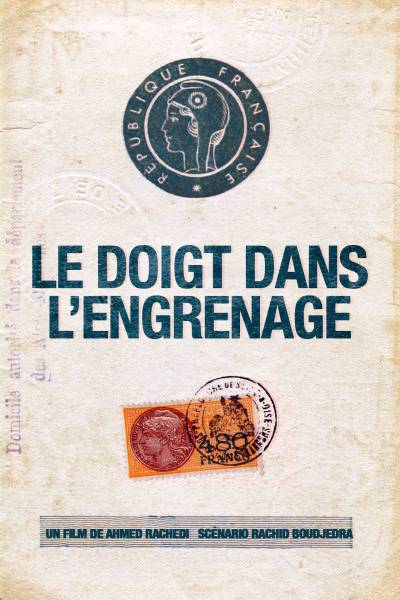 Le Doigt Dans L’EngrenageLong-métrage – 0Le Doigt Dans L'Engrenage (1974) est un film d'Ahmed Rachedi, écrit par Rachid Boudjedra mêlant fiction, documents filmés et interviews qui raconte l'arrivée à Paris d'un…Ahmed Rachedi est lié(e) à ce film en tant que réalisateur/trice
Le Doigt Dans L’EngrenageLong-métrage – 0Le Doigt Dans L'Engrenage (1974) est un film d'Ahmed Rachedi, écrit par Rachid Boudjedra mêlant fiction, documents filmés et interviews qui raconte l'arrivée à Paris d'un…Ahmed Rachedi est lié(e) à ce film en tant que réalisateur/trice -
Femme Courage – Louisa IghilahrizMoyen-métrage – 0Femme courage – Louisa Ighilahriz est le récit autobiographique qui retrace la vie tourmentée d’un témoin du siècle : Louisa Ighilahriz, militante et haute figure de l’indép…Ahmed Rachedi est lié(e) à ce film en tant que scénariste
-
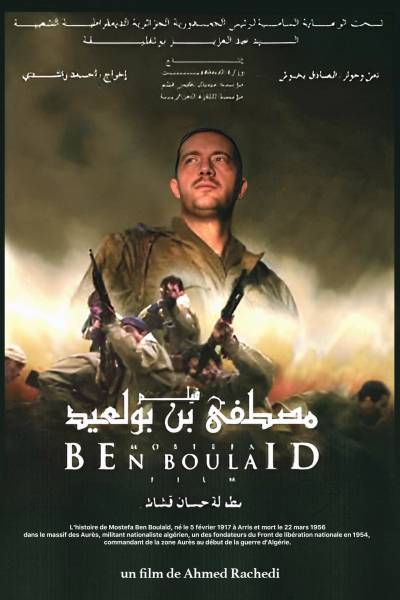 Mostefa Ben BoulaïdLong-métrage – 0Ce film retrace le parcours de Mostafa Benboulaid, grande figure historique du Mouvement national et de l'Organisation spéciale et son rôle pendant la Guerre de libération, notamment dans la r&eac…Ahmed Rachedi est lié(e) à ce film en tant que réalisateur/trice
Mostefa Ben BoulaïdLong-métrage – 0Ce film retrace le parcours de Mostafa Benboulaid, grande figure historique du Mouvement national et de l'Organisation spéciale et son rôle pendant la Guerre de libération, notamment dans la r&eac…Ahmed Rachedi est lié(e) à ce film en tant que réalisateur/trice
Partager :



